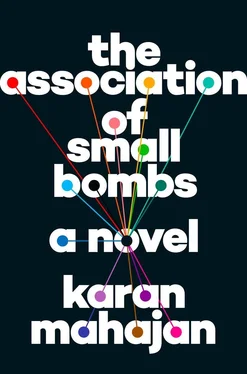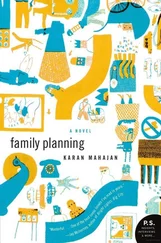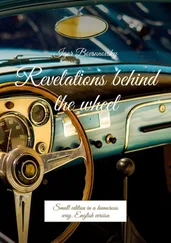“Let’s go to Lajpat Nagar first,” Tushar said. “That’s OK, no?” he said, turning to Mansoor.
Mansoor grinned. He knew he was supposed to be dropped home first, but he liked being bossed around by rebellious people so he could break the rules and be let off the hook.
At twelve, Mansoor had an amazing, ingratiating grin, and a mouthful of crooked teeth that would never be fixed.
A few minutes later, the boys strolled around Lajpat Nagar together, Tushar teasing Mansoor and slapping his back and Nakul carrying himself proudly, combing his hair and fine-tuning it with his fingers like a radio. “And that’s the framing shop where we got that Founder’s Day photo framed,” Nakul said. “We bought Sorry and backgammon from the shop behind it.”
“They sell classy English willow bats there,” Tushar chimed in, though he was a terrible cricketer.
Mansoor, unused to being out on his own, took in the sights and sounds. The crowds consisted of a particular kind of Delhiite Mansoor recognized immediately. This sort of Delhiite was slightly malnourished, wore shiny polyester clothes, grew a black mustache, had a fondness for stud earrings, kept his pants hitched too high, let his fingers roam his nose, used slightly loose, lackadaisical hand gestures, and had a cynical dumb face that could never seem grave (the women looked the same, but with lighter mustaches and cheap floral saris).
“Where are we going?” Mansoor was asking when an explosion ripped his sentence in two and stuffed half of it back in his mouth.
________
Later, everyone reported seeing a gushing white star, and there was a long silence before the screams started, as if, even in pain, people watched each other first to see how to act.
________
When Mansoor woke up, the market was burning. People lay in positions of repose. Mothers were folded bloodily over daughters; office-going men were limp on their backs with briefcases burning beside them; and shopkeepers crawled on their elbows while cars burst into flames inches from their faces. Through a woman’s ripped kurta Mansoor spied his first breast. His own wrist was oozing blood but the sensation was far from him, like something hidden in another corner of the market.
People began climbing over the corpses with the guilty looks of burglars, their hair frazzled and wild and faces half-black. Mansoor, lifting himself up too, saw Tushar lying on the ground and staring up at the sky, his lips wet and open, his curly hair full of sand, or another whitish substance blasted off a wall. Nakul was next to him with his arm over his face like a worker dozing in the sun.
“Tushar! Nakul!” He was unable to hear himself. But when he crawled over to shake them, a sharp pain erupted in his hand and he looked up to see a torn leather shoe pressing down on it and then a disfigured man disappearing over him and the bodies.
“Uncle!” Mansoor screamed. But the man was gone and others — gory, bleeding — kept coming.
Then a hand gripped Mansoor’s shoulder. “Get up, son,” the disembodied voice said — a kindly voice, the voice of the earth, full of pity and groaning patience. But an old instinct about not talking to strangers took hold and Mansoor ran from the burning square.
________
By now Afsheen Ahmed had become very anxious about her son’s absence and had called Deepa Khurana.
“He’s still not reached?” Deepa said, cramming the phone between her ear and shoulder and gazing out the windows, her hands covered in cake mix. “They must have got stuck in a jam on Ring Road — there’s lots of construction happening near Ashram. And the boys were supposed to go to Lajpat Nagar after dropping Mansoor. It could be that they went there first. They’re all such independent boys already.”
When Afsheen heard this, she turned cold. “Deepa, there’s been a blast there.”
“Rush hour is still going on,” Deepa said. “They should be reaching just now.”
“A bomb.”
“I see,” Deepa said, surprised at how stern she herself sounded. She’d always believed that misfortune was brought on by those who worried it into existence.
“I heard it on the radio. I was in the kitchen and it was playing on the servants’ radio.” Afsheen was now crying.
“Afsheen,” said Deepa, softer.
Soon after, Deepa got off the phone and went to the landing of the flat and looked down the stairs. No sign of her husband. “Go find sahib,” she instructed Hari, the servant, who took off quickly, his Hawaii slippers thwacking. Deepa washed her cake-smeared hands, absently running a palm through her hair and leaving a white streak there, like Indira Gandhi. Then she went down in her faded kurta to the gate. When she saw the car was missing, she swore loudly. Where had her husband gone and when would he return? He couldn’t be trusted. He was absentminded.
She strode to the main road and hailed an auto herself. It never occurred to her to ask any of Vikas’s relatives in the complex for help.
________
In any case, Vikas — deep in the disinfected, bloated governmental belly of the hospital — beat them all to it. He found Tushar and Nakul laid out flat on a dhurrie amid other bodies. Nakul’s pretty eyes were blasted open in fright. Tushar slept peacefully, as he always had. Getting down on his haunches, rocking on his heels, Vikas pressed their cold, burned cheeks and wept, adding his fluids to theirs.
When he looked up (hours later, it seemed), Sharif and Afsheen Ahmed were standing over him — Sharif, fat and hassled-looking, with his black disordered beard, his checked shirt and black pants swelling around his belly; Afsheen, dark, her oval face ruined with tears, her slim body wrapped in an elegant chikan salwar, the whiteness of her clothes out of place on this tarmac of death. Vikas’s own clothes had long ago turned the color of soot, of radically vaporized skin and bone. “I’m so sorry,” Vikas said — his first words in the morgue. “I’m so, so sorry.”
________
Mansoor was still walking.
When the explosion had happened, he had panicked and run away from the burning square and into the shacks. Then, as he searched for a PCO to call home or a stranger to lead him to a phone (he prayed for his phone number, which had vanished from his mind), the dark, sunless alleys distending with people swarming away from and toward the explosion, he panicked again. He’d never been alone anywhere in Delhi, let alone a market after an explosion.
“Did someone’s LPG cylinder burst?” a woman asked.
Mansoor was unsure if he was being talked to.
“Must have been Arora’s compressor,” another man, this one with a terrible tumor growing out of his neck, said.
“They shouldn’t have installed it. The wires here can’t take the load, but they don’t listen even if they’re being told at the association meeting.”
Another boom came from the market — perhaps an actual LPG cylinder going up in a blue column — and the men and women packed together in the alley screamed and there was a muscular pushing and everyone surged out to the main road, where Mansoor, coming across the fresh, untouched life of the city, its towering buses and belts of filth and mud, felt suddenly acute with life, with smoke.
“Bhaiya, you’re OK?” an auto driver asked, walking away from his vehicle with his hands on his hips, but Mansoor instinctively moved away from him, trying to stanch the bleeding in his right wrist with his left hand. He wondered if he had gotten his tetanus booster on time. He had always wondered about the efficacy and necessity of these injections, but now he was grateful.
The auto driver’s top few shirt buttons were undone; a locket flared in the light amid the drowsy sparse chest hairs. “I’m fine, uncle,” Mansoor said for reasons he could not understand.
Читать дальше












